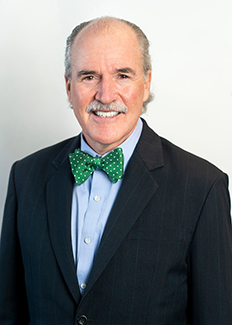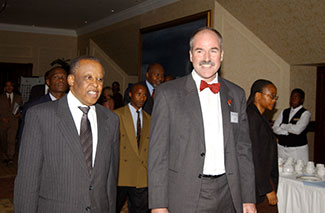The collateral benefits of the U.S. President's Emergency Plan for AIDS Relief
September 29, 2023
The U.S. President's Emergency Plan for AIDS Relief (PEPFAR) has been an essential part of the global response to HIV/AIDS. Its numerous collateral benefits include building capacity to address other health threats.
I was the country director for the U.S. Centers for Disease Control and Prevention (CDC) in Botswana when President George W. Bush announced the PEPFAR program two decades ago. At that time, the prevalence of HIV-1 infection in pregnant women was 37%. Botswanan President Festus Mogae rightly stated that the country faced extinction. With support from PEPFAR and other funders, Botswana was able to rapidly ramp up HIV screening, antiretroviral treatment, and viral load testing. I attended patients in the public HIV clinic in Gaborone every Thursday morning and witnessed first-hand the “Lazurus effect" of people who'd been gravely ill with advanced HIV infection; once started on treatment, they'd gain back lost weight, get up from their sick beds, and return to their usual activities.
 Read recent
blogs and articles from Acting Fogarty Director Dr. Peter Kilmarx.
Read recent
blogs and articles from Acting Fogarty Director Dr. Peter Kilmarx.
Fast forward two decades, and extraordinarily, with ongoing support from PEPFAR, Botswana has already officially achieved—before the 2025 target date—the UNAIDS “95-95-95" goals, which call for 95% of all people living with HIV to be aware of their status, 95% of those aware of their status to be on antiretroviral treatment, and 95% of those on treatment to achieve viral load suppression.
Meanwhile, PEPFAR also supported the development of a robust national HIV surveillance system in Botswana with routine genomic sequencing of HIV-1 isolates from around the country. When the COVID-19 pandemic reached Botswana, Dr. Sikhulile Moyo, a Fogarty trainee and grantee, leveraged that capacity for genomic surveillance of SARS-CoV-2 thereby becoming the
first to sequence, identify, and alert the world about the emergence of the omicron variant in November 2021. This was just one of many examples worldwide of PEPFAR-supported public health capabilities being brought to bear in response to COVID-19.
I experienced another example of the broader public health benefits of PEPFAR in 2014 when I was the CDC country director implementing PEPFAR programs in Zimbabwe. In September, I was deployed to lead the CDC Ebola response in Sierra Leone, which, like neighboring countries Liberia and Guinea, had much lower HIV prevalence and did not have PEPFAR programs. In Zimbabwe with PEFPAR support, we'd established a health management information system with mobile-phone-based reportable disease surveillance in nearly all health facilities nationwide. We'd also created a national laboratory system with regular specimen transport and electronic return of results for HIV infant diagnosis and other tests. A third system we'd implemented was a national information system for human resources related to health to track health care workers' deployment, training, and other attributes. None of the critical public health systems we'd established with PEPFAR funding in Zimbabwe were present in Sierra Leone or its neighboring countries, which greatly hampered the Ebola response. Had PEPFAR programs been present in West Africa, many of the more than 11,000 deaths from Ebola could have been averted.
 Photo courtesy of Peter KilmarxDr. Peter Kilmarx (right) meets President Festus Mogae (left) at the 10th Anniversary of CDC Botswana (BOTUSA) in 2005.
Photo courtesy of Peter KilmarxDr. Peter Kilmarx (right) meets President Festus Mogae (left) at the 10th Anniversary of CDC Botswana (BOTUSA) in 2005.
A third example of an added benefit of PEPFAR has been the implementation of medical and health professional education programs in Africa funded by PEPFAR and implemented by Fogarty. Beginning in 2010, PEPFAR supported the
Medical Education Partnership Initiative (MEPI), followed by the Health-Professional Education Partnership Initiative (HEPI) and the
The African Forum for Research and Education in Health (AFREhealth). The NIH Common Fund and other NIH Institutes and Offices provided additional funding for related research training and capacity building programs.
The primary goal of all these programs was to strengthen the education of health professionals in Africa to address the severe health workforce shortages on the continent, increasing the number of graduates, the quality of their education, and their retention, especially in underserved areas. Interventions included raising the number of medical school enrollees, revising curricula, recruiting new faculty, enhancing faculty development, expanding the use of clinical skills in laboratories and community and rural training sites, strengthening computer and telecommunications capacity, and increasing e-learning. Through HEPI, which started in 2018, grantees are expanding innovative education models, including interprofessional education activities, and enhancing opportunities for students to conduct locally relevant research as an integral part of their professional training. And AFREhealth has emerged as the premiere pan-African institution working with African governments, academic institutions, and others to improve access to and the quality of health care through research, education, and capacity building.
As the world's largest program focused on a single disease—HIV/AIDS—PEPFAR has transformed the public health landscape in countries where it's been implemented. Rates of new HIV infection and deaths from HIV/AIDS have declined significantly. Beyond this, there have been substantial collateral benefits in preparedness and response to other infectious disease threats, the capacity of public health programs generally, and a transformation in health education and research capabilities in academic institutions. We at Fogarty have been proud to partner with PEPFAR in these efforts.
Note: The current PEPFAR authorization ends on September 30, 2023.
More Information
Updated September 29, 2023
To view Adobe PDF files,
download current, free accessible plug-ins from Adobe's website.
Related Fogarty Programs
Related World Regions / Countries
Related Global Health Research Topics